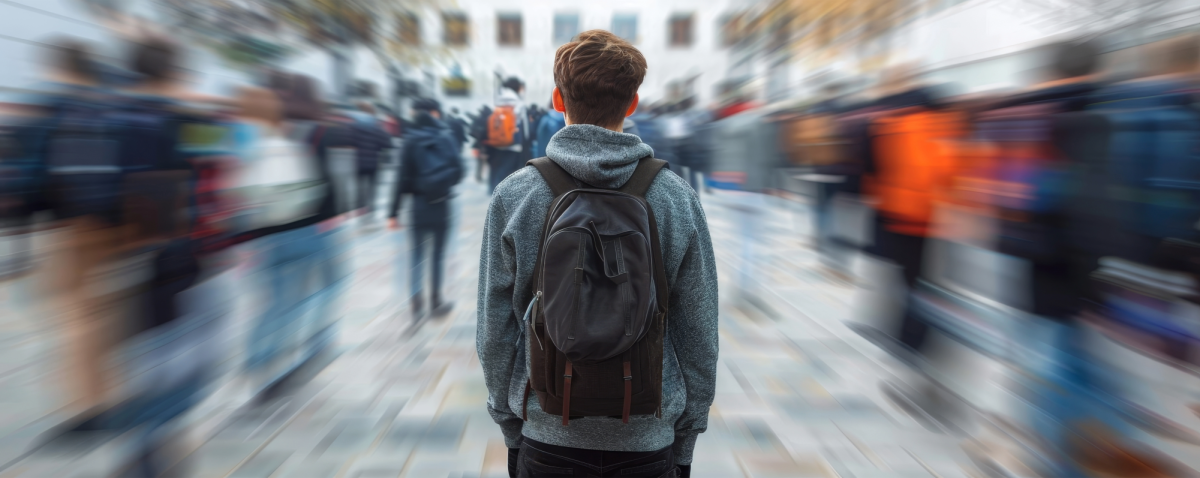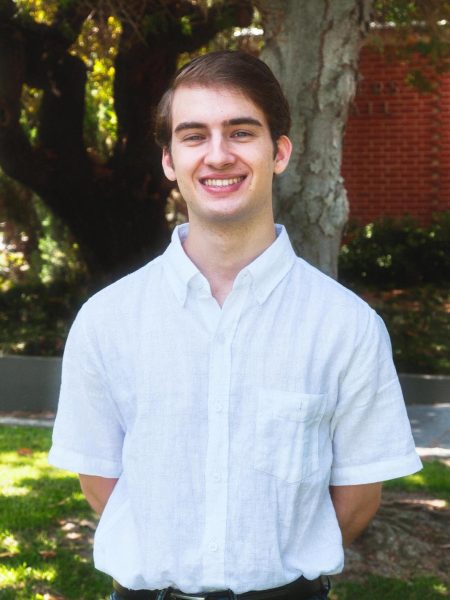I’ve always had an odd go of it with the last name Cohen. Most Ashkenazi Jews in America are white-passing, so they get to choose whether or not they want to advertise their ethnicity. I don’t get that opportunity. Every hiring manager or officer who sees my ID knows I am Jewish.
This means that I have served as a target for antisemitic rhetoric my whole life. During the Woolsey fires in 2018 which ravaged Ventura County, California, numerous peers at my high school told me that the ashes on the floor were “Jacob’s grandparents” and that the smokey scent in the air “smelled like Jews.”
On the other end of the spectrum, I have been treated like one of “God’s chosen people” by evangelical groups and unintentionally otherwise. Jewish people do not want to be catered to like God’s anointed, nor do we want to be hunted for our culture; we just want to be treated like everyone else. This is my desire at Biola as well.
Biola has served as both a challenge for Jewish students and a glimmering light for reconciliation between people of different backgrounds.
A FORGOTTEN COMMUNITY
The Jewish experience at Biola can be summed up with one word: lonely.
This year’s Torrey Conference featured several panelists during one of its main sessions — one of them was Simon Greer, a non-Christian Jew. Greer highlighted the stark numerical disparity between faith groups on a global scale.
“I don’t think you guys understand. It’s a numbers game … If half the gymnasium represents Muslims and a slightly smaller half represents Christians, we [Jews] are this water bottle,” said Greer while pointing to the water bottle at his feet.
On a global scale, Jews represent 0.2% of the world’s population, and at Biola, that number seems like an overstatement.
Santiago Kraft, a senior cinema and arts major and president of Anashim, the Jewish heritage club on campus, said, “I don’t think there are more than twenty Jews on Biola’s campus.”
Last semester, Anashim advertised a Passover meal, known as a seder, that included catered food. The only people who showed up were the five pre-existing club members.
Despite Anashim’s efforts to appeal to and invite a large segment of Biola, the low student participation in Jewish heritage and cultural events might be due to a lack of interest in engaging with and learning from these types of events.
FACING ANTISEMITISM
Kraft told me that he has been on the receiving end of insensitivity multiple times since being at Biola.
“The first time was during my freshman year. I remember it because it was going to be my first year not celebrating Rosh Hashanah with my parents. I stayed behind to host a little meet and greet for freshmen, and that’s when a few of them thought it would be funny to greet me with a Hitler salute once I told them I was Jewish,” said Kraft.“The second time was my work at Biola choosing to play Secret Hitler at a group bonding event.”
He recalled being confused as to why anyone would think it was a good idea to play a game called “Secret Hitler” at a work event in the first place. He recounted a pattern of antisemitic jokes and salutes targeted towards him during the rest of the night.
Unfortunately, Kraft’s stories are not an isolated incident.
Biola alumna and previous Anashim president Sarah Gross described a recurring pattern of antisemitic targeting in the theology program. She recalled hearing a professor blame the Jews not only for the death of Jesus but also for the destruction of the third temple.
Gross stated, “The professors cared and were understanding with every racial group, but not the Jews. ”
Gross recalled even having to deal with fellow theology students asking “how she was allowed to go to Biola,” considering the fact that she has Jewish descent. She highlighted that she does not believe that the antisemitism was intentional.
“When I try to talk to the people making insensitive comments, some of them make the requisite changes, and some of them don’t. Attending Biola shouldn’t mean that I have to be the single person educating the campus. They should know that certain comments just aren’t appropriate. If some of the Biola faculty handled this with the same care that other issues were, then we wouldn’t have this problem,” said Gross.
OCT. 7: A GREAT BETRAYAL
Sarah Mills, a senior sociology major and president of the Anti-Human Trafficking Club, is a student with Jewish heritage. She recalled trying to set up for an event mourning the victims of Hamas’s attack on Oct. 7, 2023, when a passerby asked, “Why can’t we just get along?” They continued, “If I can forgive all of Jews for killing Jesus — If I can forgive you, why can’t we all get along?”
Mills also noted that even the posters and flyers she posted around campus to advertise a vigil for the victims were destroyed and torn down.
During Torrey Conference 2024, Greer made a distinction between Oct. 7th and other tragedies across the world.
“When Ukraine was invaded, the entire global community banded together, but when Israel was attacked, it was silent,” said Greer.
As a Jewish man at Biola, I had some similar experiences regarding the Oct. 7 attack. Some faculty, including Diane Vincent, a professor at the Torrey Honors College, checked in on me and gave their sympathies.
However, I was also met with harassment.
I remember vividly that same week being mocked with laughter and a bombardment of questions asking if “I had more of an allegiance to Israel or ‘America.’” Any status I had as an American citizen was seemingly stripped from me because of my last name.
The accusation of having a dual loyalty towards Israel stems back to the Dreyfus affair, where a Jewish-French officer was wrongly accused of sharing secrets with the German Empire to further the nebulous “international Jewish cause.”
The American Jewish Community (AJC), a civil rights and Jewish advocacy group, labels dual loyalty as a known antisemitic epithet.
“Dual Loyalty is a bigoted trope used to cast Jews as the ‘other.’ For example, it becomes antisemitic when an American Jew’s connection to Israel is scrutinized to the point of questioning,” AJC stated in their glossary.
I remember feeling the desire to leave Biola’s campus to mourn the losses in a safe place because it was clear that Biola was not.
Gross shared my experience.
She stated, “There is no space to celebrate Jewish culture, or to even talk about antisemitism, which means there is no space for anyone to hear about antisemitism and to learn about it because the classes that should talk about it don’t.”
Gross closed by saying, “To be at Biola while trying to appreciate my Jewishness instead of pretending I wasn’t was brutally hard.”
THE GLIMMERING LIGHT
Fortunately, the story does not end there. While there have been heartbreaking and bigoted salvos against the Jewish community, Biola’s administration has actively worked towards making Biola a haven in contrast with other college campuses.
Other colleges like University of California, Los Angeles (UCLA), and Columbia University sanctioned and defended anti-zionist protests, which became violent and actively sought to physically harm Jews.
Regardless of whether or not you fall on the Israeli or Gazan side of the conflict, there is no reason to resort to physically harming other students.
Darin Lenz, dean of the history department, co-sponsored a prayer vigil for the victims of Oct. 7. While attending, I saw numerous faculty members and professors take part in praying over the hostages in Gaza.
In this same light, the provost’s office encouraged students to attend the Nova Exhibit with charter buses to downtown LA. Another Jewish student, Shirley Ryland, a sophomore and biological sciences major, attended the exhibit.
“It just felt like we were seen. The effort that they made to make that available to us and to include us was beautiful,” said Ryland.
Biola’s administrative support culminated with the Student Mission’s Union inviting Greer to share about how we can all unite and fight back against xenophobia towards all people groups.
As Biolans, it is imperative that in dedication to one God, we do not neglect the second great commandment of loving one another. Biola has always been a home for all of us, and while that hasn’t always guaranteed safety in the past, this administration is working to change that.
Shalom Aleichem!






